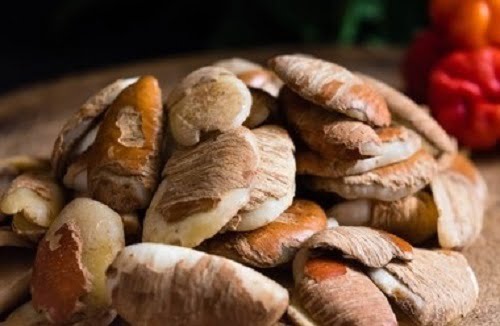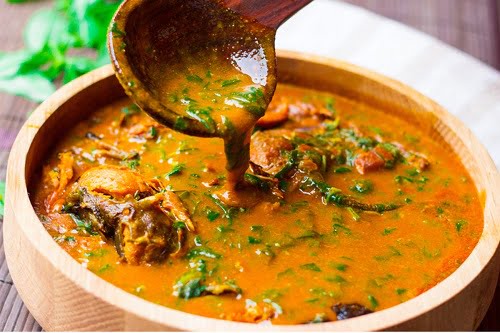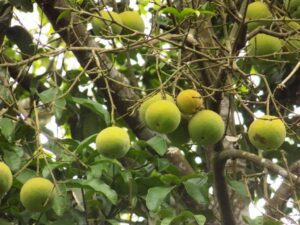Ogbono (African mango) scientifically called Irvingia gabonensis is an African tree that originates from West Africa.
The tree is commonly called wild mango, bread tree, Dika nut, bush mango, Apon, Goron, and Mangifera gabonensis. It is widely grown in Nigeria, Cameroon, Côte d’Ivoire, Ghana, Togo, and Benin for its edible sweet fruits and seeds.
In these regions, the fatty and protein-rich seeds are the most popular part of the tree and are ground to prepare a local soup that is eaten with fufu (yam or cassava pudding).
Recently, studies have discovered that seed extracts of ogbono can be employed to treat weight loss, insulin resistance, and high cholesterol.
This article reviews the possible benefits of ogbono to diet and health.
Nutrition Facts
The fruit and seeds of the ogbono (African mango) tree are incredibly nutrient-packed.
The seeds are rich sources of fats, protein, carbs, iron, calcium, and antioxidants.
100 grams of the seeds will provide you with about 595 calories and the following nutrients [1]:
- Fat: 56 grams (g)
- Carbohydrates: 17 g
- Protein: 10 g
- Water: 6 g
- Dietary fiber: 2 g
- Calcium: 77 milligrams (mg)
- Iron: 2 mg
- Potassium: 60 mg
Dika fat, the fat extracted from the seeds, is a good source of myristic, lauric, palmitic, and oleic fatty acids [2].
Unlike some other varieties like Irvingia wombulu that produces bitter fruits, the fruits of Irvingia gabonensis are fleshy and edible. The pulp is rich in vitamin C and yields about 70% juice.
100g of the edible pulp will provide you with approximately 59 calories and the following nutrients [3]:
- Fats: 1 (g)
- Carbohydrates: 11 g
- Protein: 1 g
- Moisture: 80 g
- Dietary fiber: 0.4 g
- Calcium: 263 milligram (mg)
- Vitamin C (Ascorbic acid): 67 mg
Health Benefits of Ogbono (African mango)
The following are 6 possible benefits:
Antioxidant activity
Antioxidants are substances that help the body fight against free radicals that cause cell damage and diseases like diabetes, cancer, and heart disease.
Studies have found that ogbono seeds contain rich amounts of flavonoids, ellagic acid, and lupeol – potent antioxidants that protect the body cells against oxidative damage [2].
Diabetes
High blood sugar and insulin resistance are common symptoms of diabetes.
Scientists have revealed that the seeds of ogbono are made of water-soluble dietary fibers that act as bulk-forming laxatives and delay stomach emptying – leading to a more gradual absorption of dietary sugar, which helps to reduce a spike in blood sugar after meals [4].
One clinical study found that feeding 11 diabetic patients 4 grams of ground ogbono seeds for one month reduced blood sugar and bad cholesterol levels in the blood [5].
Another study in animals found that a single oral administration of the methanol extract of Irvingia gabonensis at doses of 150 and 250 mg/kg significantly lowered the plasma glucose levels in diabetic mice two hours after treatment [6].
However, more studies are needed are to confirm the exact mechanism of action of ogbono seed extracts.
High cholesterol
High cholesterol can increase the risk of a stroke or heart attack.
Studies have found that the seed extracts of Irvingia gabonensis can reduce bad cholesterol levels and increase good cholesterol levels in people who are overweight [5].
Weight loss
Ogbono (African mango) has become popular as an “obesity killer”. It is currently packaged and sold as a weight-loss supplement in many stores.
Although more clinical trials are required, one 10 week study in 102 overweight patients who were administered 150 mg of Irvingia gabonensis extract twice a day, found a reduction in weight (body weight, body fat, waist circumference) and metabolic parameters (plasma total cholesterol, LDL cholesterol, blood glucose) associated with insulin resistance [7].
In another 4-week study in 40 obese patients, those who took 350 mg of African mango extract had significant drops in the waist circumference, triglycerides, and VLDL (bad) cholesterol compared with the placebo [4].
These studies suggest the potential of ogbono seeds as a useful weight-loss tool. However, more in-depth studies in humans are required.
Infection
Studies have claimed that the leaf, root, and stem bark extracts of the African Mango tree may have activity against several microbial and fungal infections [8].
However, more human studies are required to fully understand its mechanisms.
Gastrointestinal activity
One study claims that plant extracts of ogbono possess anti-ulcer and anti-diarrhea activity.
The study found that the extracts act by reducing the secretion of stomach acids and increasing the mucus secretion to coat the lining of the stomach [9].
Another animal study discovered that ogbono leaf extract protected mice against castor oil-induced diarrhea and assisted in decreasing GI motility [10].
Other Uses of Ogbono (African mango)
Ogbono seeds, fruits, leaves, roots, and bark are very versatile. The following are different uses of the plant parts:
Seed
Soup: In parts of Nigeria, Ghana, and Gabon, the dried, ground seeds of ogbono (African mango) are used to prepare a local delicacy called “ogbono soup”. Ogbono soup is prepared with fish, beef, okra, pumpkin leaves, crayfish, and seasonings. The seeds serve as the thickener.
The soup is healthy, low in calories, and often eaten with fufu (casava or yam pudding).
Also read: 10 Reasons why Egusi (African melon seed) is good for You
Dika bread: The ogbono seeds are pounded into a cake called ‘dika bread’ or ‘odika bread’ for easy use and all-year-round preservation [11].
Oil: An edible brown-colored oil is extracted from the ogbono seed that can be used in cooking. The oil is solid at room temperatures and can be used as a substitute for cocoa butter in cream and soap making.
Fruit
The ogbono (African mango) fruit is a yellowish drupe with a juicy fibrous pulp when ripe. It has a stony nut inside that encases the kernel of the seeds.
The ripe pulp can be used to prepare juice, jelly, jam, and wine. The wine produced from the pulp tastes great and is generally acceptable.
Also, the pulp can be boiled to prepare a black dye for clothes.
Leaves
In southeastern Nigeria, the Igbos use the leaves of the African Mango tree to prepare a concoction that is used in treating fevers. The leaves are also chewed to treat diarrhea and stomach upset.
Bark
In some parts of West Africa, the bark of the African mango tree is used as an analgesic to relieve pains. It is crushed and applied to sores and wounds. It is also used to relieve toothache.
Possible Side Effects
Over the years, they have been no reported human side effects associated with consuming the whole ground seeds of ogbono (African mango) in soups.
One toxicity study in mice found that an extract of African mango did not cause any adverse effects at ≥ 2500 mg/kg BW/day, the highest dose tested [12].
However, more human studies are needed, as a case study suggested that a 42-year-old patient with chronic kidney disease had to start dialysis after two and half months of taking African mango extract [13]
Additionally, prescription medications for people with diabetes and high cholesterol should be coadministered with caution to avoid drug-herb interactions.
The Bottom Line
Ogbono (African mango) is a versatile plant with so many healthful benefits.
The part plants, especially the seeds are rich in fats, protein, carbs, vitamins, minerals, antioxidants.
In addition, the seeds are effective against obesity, GI problems, diabetes, and high cholesterol.
And the best part is that it gives a sweet-tasting wine, a rich cooking oil, and can be used to thicken delicious soups and stews.
Did you find this article helpful? Leave your comments and questions below!
- Bamidele, et al. Physico-chemical properties of instant ogbono (Irvingia gabonensis) mix powder. Food science & nutrition vol. 3,4 (2015)
- Olufunke O. et al Irvingia gabonensis Seed Extract: An Effective Attenuator of Doxorubicin-Mediated Cardiotoxicity in Wistar Rats. Oxidative Medicine and Cellular Longevity (2020)
- Onimawo, I et al. Physicochemical and nutrient evaluation of African bush mango (Irvingia gabonensis) seeds and pulp. Plant Foods Hum Nutr 58, 1–6 (2003)
- Ngondi J. et al. The effect of Irvingia gabonensis seeds on body weight and blood lipids of obese subjects in Cameroon. Lipids in health and disease (2005)
- Adamson I. et al. A supplement of Dikanut (Irvingia gabonesis) improves treatmei
- nt of type II diabetics. West African journal of medicine (1990)
- Ngondi J. et al. Glycaemic variations after administration of Irvingia gabonensis seeds fractions in normoglycemic rats. Afr J Traditional Complement Alternative Medicine. (2006)
- Ngondi J. et al. IGOB131, a novel seed extract of the West African plant Irvingia gabonensis, significantly reduces body weight and improves metabolic parameters in overweight humans in a randomized double-blind placebo-controlled investigation. Lipids in health and disease. (2009)
- Fadare, D A, and E O Ajaiyeoba. Phytochemical and antimicrobial activities of the wild mango-Irvingia gabonensis extracts and fractions. African journal of medicine and medical sciences. (2008)
- Raji et al. Anti-Diarrhegenic and Anti-Ulcer Properties of Irvingia gabonensis in Rats. Pharmaceutical Biology. (2008)
- Abdulrahman F. et al. Effect of aqueous leaf extract of Irvingia gabonensis on gastrointestinal tract in rodents. Indian journal of experimental biology (2004)
- Tchoundjeu Z, Atangana, AR (2007). “Irvingia gabonensis (Aubry-Lecomte ex O’Rorke) Baill”. Plant Resources of Tropical Africa (PROTA); van der Vossen HAM, Mkamilo GS (Editors); Wageningen, Netherlands.
- Kothari C. et al. Subchronic toxicity and mutagenicity/genotoxicity studies of Irvingia gabonensis extract (IGOB131). Food and chemical toxicology journal. (2012)
- Özkan, Gülsüm, and Şükrü Ulusoy. A case of renal failure developing in association with African mango consumption. International journal of clinical and experimental medicine, vol. (2015)
Get new free and exclusive health tips delivered straight to your inbox!




